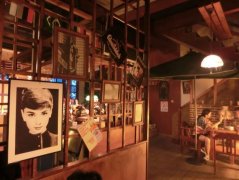The distance between China and the hometown of M á rquez, a cup of coffee

Many Chinese equate coffee with Colombia, and Colombian Nobel Prize winner M á rquez also shows a golden age of coffee and literature in his works. With the increasingly close relationship between China and Colombia, it is easy to have a cup of unsweetened Colombian coffee as described by Marquez.
Marquez and his Colombian Coffee
Colombia is the second leg of Premier Li Keqiang's first visit to Latin America. In the hometown of M á rquez, Chinese and Colombian leaders will jointly attend the seminar on people-to-people exchanges between China and Latin America, and Chinese Nobel Prize winner Mo Yan will also pay tribute to the Latin American writer here.
Colombia is a world-famous "coffee kingdom". There are not only coffee cultural landscapes listed as a UNESCO World Heritage site, but also mobile vendors peddling "thermos" coffee in the streets. You can also taste the literary style of "red wine coffee" in countless exquisite cafes. In the 1940s, M á rquez often lingered in the cafes of Bogota, the capital, and became the starting point of his writing career.
Coffee has a strong sense of existence in M á rquez's works. In his masterpiece, A hundred years of Solitude, every chapter talks about Colombian coffee, and the cup of unsweetened coffee runs from the beginning of the story to the end.
Coffee, as the top four treasures of coffee, flowers, gold and emeralds in Colombia, is not only an important source of economy for the South American country, but also represents a culture and way of life.
Colombians who love coffee measure the happiness of life with the spoon of coffee in the indispensable "coffee time" of the day. Colombia ranked second in the global happiness region in 2014, according to the British New Economics Foundation.
Uncle Juan: the M á rquez of the coffee industry
Uncle Juan is the face of Columbia Coffee. If M á rquez makes Latin American literature to the world, then Uncle Juan is undoubtedly the "M á rquez" of Colombian coffee, pushing Colombian coffee to the world.
Wu Jiahang, chief representative of the China region of the Colombian Coffee producers Association, said in an exclusive interview with Xinhua: "out of the need of the global coffee differentiation strategy, Colombia launched Uncle Juan as the global coffee spokesman in the 1960s. It represents the image of 560000 coffee growers and producers, and strictly controls the quality and global promotion of coffee under Colombia's decentralized small farmers."
Carlos Casstaneda, the third-generation Uncle Juan, went through a two-year process before becoming Uncle Juan from a native coffee farmer in 2006.
"Uncle Juan's values such as diligence, integrity, simplicity and optimism play an important role in Colombian Coffee's popularity to the world and Colombia's national image." He said.
Uncle Juan, who stood out from hundreds of thousands of candidates, lived up to expectations. The uncle, dressed in a white straw hat, Andean wind shoulder and shoulder bag, led an inseparable mule "little shell." Zeng beat Uncle McDonald's to become the most popular advertising image in the United States.
"A good cup of coffee can be painless."
It has been said that Colombia is a "land saved by coffee". Since coffee was first brought to Colombia by a priest from French Antilles via Venezuela in 1808, coffee has taken root in Colombia, a "land saved by coffee" and now has a reputation as "green gold".
In Wu Jiahang's eyes, mellow, soft and balanced. Are not enough to describe the characteristics of Colombian coffee. "Colombian coffee is rich and varied in flavor. A good cup of coffee is not only not bitter, but also contains different flavors such as fruit, nuts and grains. Colombian coffee is still unparalleled without being decorated with milk sugar."
He said that as many as 88 ecological landforms in the hinterland of the Andes are very conducive to the accumulation of coffee aroma substances, making Colombia one of the few countries in the world that can harvest coffee all year round. "Flowers and fruits on the same branch has become a unique landscape of the coffee garden, and this core competitiveness has made Colombia the largest producer of fresh coffee beans and washed coffee in the world."
According to reports, at present, the planting area of coffee in Colombia has reached 970000 hectares, and the planting scope has far exceeded the "Coffee Golden Triangle" zone where the coffee cultural landscape is located. In 2014, production reached 11.5 million bags (60 kg each).
Columbia Coffee is one of the few individual coffees sold in the world under the name of the country. In the New York futures market, MAMS, named after the initials of Medellin, Armania and Manisarez, which forms the triangle, refers to Colombian coffee.
Colombia is far away, but Colombian coffee is very close.
A Colombian coffee bean picked by hand, carried by mules, desized, fermented, washed, dried, shelled and graded entered the Chinese market as early as the late 1990s. As the first country to promote coffee of origin in China, Colombian Coffee has witnessed changes in the Chinese market.
As more and more Chinese start a perfect day with a cup of coffee, Colombian coffee exports to China have maintained an active growth trend. It is reported that China's first order of Colombian coffee is only about 30 tons, while in 2014, the figure has soared to 2000 tons. Colombian coffee is available in e-commerce and brick-and-mortar stores such as Taobao and No.1 store.
"the biggest change in the Chinese market lies in the refinement of the coffee market and the increased demand for high-quality taste. As the concept of health takes root, a healthy cup of low-heat black coffee without milk sugar is becoming more and more popular, which is what high-quality Colombian coffee can provide. "
Wu Jiahang, who has been in China for nearly 10 years, said that although China is a big country with tea culture, it has great potential to grow into a big coffee consumer. He also said that Prime Minister Li Keqiang's first visit to Colombia will speed up the negotiation of a free trade agreement between China and Colombia and bring more benefits to Chinese consumers. Another dream is to open a Juan Dizi flagship coffee shop in China.
Important Notice :
前街咖啡 FrontStreet Coffee has moved to new addredd:
FrontStreet Coffee Address: 315,Donghua East Road,GuangZhou
Tel:020 38364473
- Prev

During the rainy season, singles are better suited to cafes.
The difficulty of the meal may depend on the sky. No one goes out because it is too hot, it is too cold and no one can go out even if it rains a little. Fuzhou is worth going out for a dinner chat. Only in March, April and October and November can you barely watch the sky go out. Now that it is the rainy season, it is even more difficult to form a game. In general, organizing a dinner is like writing a copywriter and surfing the Internet.
- Next

The Story of the Caf é in the Cafe
Gu Yue was 22 years old and was a handsome little boy in Chongqing Vector Cafe. In his world, everything is new and unknown. In the summer of 2008, he met Marie. She is over 60, dressed in a suit, slightly fat, but elegant. She looks very kind, especially when she purses her lips like a lovely child. Gu Yue remembers her with silent eyes.
Related
- How did the Salvadoran coffee industry develop in Central America?
- What exactly does the golden cup extraction of coffee mean?
- The Origin of Coffee flower
- [2023 Starbucks World Earth Day] there are more meaningful things besides free Starbucks coffee!
- What kind of coffee is there in Spain? 9 Flavors of Spanish Coffee
- Aromatic African coffee| Kenya's coffee culture and historical production area
- Liberica Coffee Bean knowledge: the characteristics of Liberian Coffee beans of the three original species of Coffee beans
- The origin and formula of Spanish latte introduces the taste characteristics of Bombon coffee in Valencia, Spain.
- How to adjust the solution of over-extracted coffee
- What is the tasting period of coffee beans? What is the period of coffee and beans? How should coffee wake up and raise beans?

